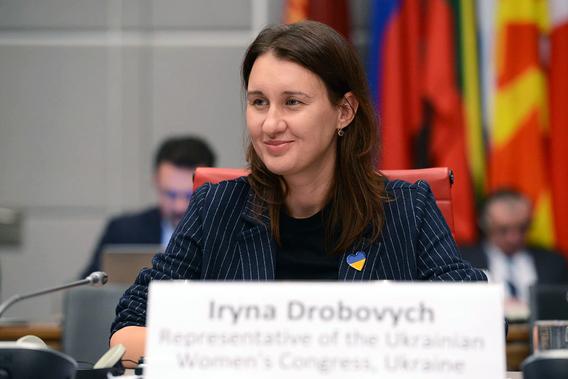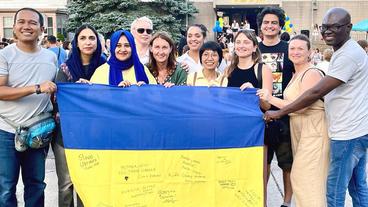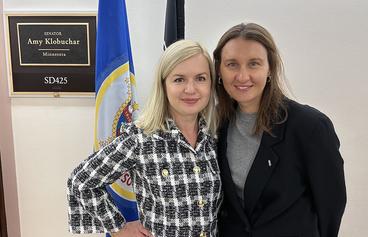
For Iryna Drobovych, spending this year as an international fellow at the Humphrey School of Public Affairs is an opportunity to learn new skills and advance her career. But she also has one eye on her home country of Ukraine, which has been at war since Russia invaded her country in 2014 and started its large-scale attack in February 2022.
Drobovych is the strategy advisor at the Ukrainian Women's Congress, a nonprofit organization promoting women’s rights in Ukraine. She’s one of 12 Humphrey International Fellows at the Humphrey School this academic year.
The fellowship program, run nationally by the U.S. Department of State, brings accomplished mid-career professionals from designated developing nations and emerging democracies to universities across the United States for a year of academic study, professional experience, and cultural exchange.
We asked Drobovych to share her perspectives on the war between Ukraine and Russia, and her experience at the Humphrey School so far. (Answers have been edited for length and clarity)
Her goals for her fellowship year:
I’m a civil and human rights activist, promoting women's rights in Ukraine. I’m in the United States now, hoping to expand my knowledge in strategy building, and looking for examples of how women can be meaningfully involved in all the spheres of government and society. I’m also looking for good practices for reconstructing the country. When I go back home next summer, I want to be involved in rebuilding efforts in Ukraine and making sure women are meaningfully participating in rebuilding Ukraine.
Her personal experience with the war:
I’m here in the United States with my 5-year-old son because my husband, as of the second day of the war, is defending our country in the armed forces of Ukraine.
I lived in Kyiv for two decades. But as soon as the war started, my son and I went back to my home city in the west of Ukraine, in the rear, where the war is not actively going on. We spent a year and a half living there with my parents [before coming here to the U.S.]. But there is no safe place in Ukraine. It’s a hard choice for every Ukrainian: either to fight, or to stay in the rear and be helpful from there; either to stay in Ukraine or to go abroad and look for a more secure place for family and for children. There is no wrong choice in these circumstances.
Her perspectives on the war:

It is a war where we are defending ourselves. Ukraine is not the aggressor. I see enormous unity in our society, enormous patriotism, and an enormous struggle for freedom and for peaceful life.
There is impressive unity on the community level. We didn’t wait for instructions from the government on what we should do in the first days of the war. People organized themselves in their communities to either defend the land or to help those who have suffered, such as the internally displaced persons who lost their homes.
I see how good our government is at managing the war. It’s been almost two years and Ukraine is still on the radar of the global media. We keep the allies supporting us.
Moreover, we are expanding our partnerships with those countries who have never done so in the past, such as the Global South, Asia, and Africa. It makes me proud of how sophisticated our diplomatic efforts are and how the country is looking long term toward building support all over the world.
I’m so proud of Ukrainian women demonstrating leadership in this war. Data from UN Women say that 70 percent of Ukrainian women have volunteered in many ways—[to support] humanitarian aid, health care, social actions, and so on. Forty-eight percent of newly established businesses during the war are being run by women. They provide jobs and contribute to the war economy. We have 60,000 Ukrainian women in the armed forces, which is more than 8 percent of the total. And 5,000 of them are fighting on the battlefield.
The role of her organization:
The Ukrainian Women's Congress is a national advocacy platform that was established in 2017 by four Ukrainian women politicians who represented four different political parties. I’m proud to be a part of this group.

Our key tasks are to advocate; to discuss urgent issues to promote and ensure equality; to bring together high-level politicians and decision makers, experts, activists, media, and business for discussion on how we can cooperate to make a difference in gender equality. Another task is to lobby for necessary changes in the law to provide women with equal opportunities in the labor market, in politics and elections, in building their careers in the armed forces.
Based on our advocacy, new legislation was passed putting in place gender quotas for [political parties’ list of candidates]. That made a difference during the last national elections. Now, 21 percent of the members of parliament are women, [compared to] only one or two women in the early 1990s.
During the war, our activity and communication have expanded to international partners. We have built a bridge to women's organizations in different countries, including Austria, Canada, Germany, Iceland, Poland, the United Kingdom and the U.S., to tell them the truth about the war, the status of women during the war, and to ensure some financial support for the projects run by women in Ukraine.
We are keeping the discussion in Ukrainian society focused on equality. Because of all the turmoil, there is a risk of bringing back old [gender-based] stereotypes. We should support women leadership, to make sure that women will be sitting at the table where all the decisions will be made for rebuilding and building peace in Ukraine. I'm very proud of the work I'm doing, and it makes me so happy how women are contributing to our common efforts.
United States support for Ukraine:
We really appreciate the support the United States as a country is providing to us, financially and militarily. But also making sure that the allies in the G7 and NATO countries stand by Ukraine and will stand as long as the war goes on.
People in the United States can help by supporting the supporters. If you would like to donate, you can do that through Ukrainian communities here in the U.S. Any financial support you provide will be appreciated by the Ukrainian people. You can also help by telling stories of people you may know who have been affected by the war, as a way of promoting the truth.
Her experience so far at Humphrey School:
I feel that I am in the right place, with the right people, at the right time. I get support from the program where I can build new partnerships. The Humphrey International Fellowship program is more about building a professional network for enriching my professional background. I have met with many organizations in the U.S. already. The program is providing me with many of the opportunities I was looking for.
I’m so lucky that the people in my cohort all have such impressive backgrounds. We share our experiences, and this makes me so open to the world. I never considered in detail the perspectives of [people from] the Philippines, or from Central American countries that experience hurricanes and other environmental issues, or from Middle East countries that for many years have been going through the challenges of war. And now I have those perspectives. We are all here to make a difference in our countries.
My analysis of what’s going on in Ukraine, in the region, but also in the whole world, is richer and more sophisticated. So I can go back home and contribute to rebuilding my country with a global perspective. This is an enormously important experience for me.
Learn more about the Hubert H. Humphrey International Fellows Program.

